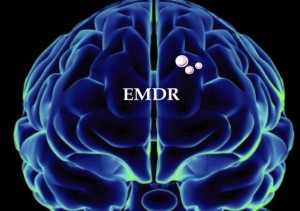Eye Movement Desensitisation and Reprocessing (EMDR)
What is EMDR?
The mind can heal naturally in the same way as the body does. The body has a natural psychological healing process which helps to deal with day-to-day stresses and minor traumas. This process helps reduce discomfort and enables us to assimilate, learn and grow from new experiences. Much of this natural coping mechanism has been found to occur during sleep, particularly during that period of sleep when we experience rapid eye movement (REM).
In 1987, Francine Shapiro used this insight to develop Eye Movement Desensitisation and Reprocessing (EMDR), initially as a treatment for Post-traumatic Stress Disorder (PTSD). Since then, EMDR has evolved into a highly effective therapeutic technique for a wide range of problems.
What happens when you are traumatised?
Most of the time your body routinely manages new information and experiences. However, when something out of the ordinary occurs and you are traumatised by an overwhelming event (e.g. a car accident) or by being repeatedly subjected to distress (e.g. childhood neglect), your natural coping mechanism can become overloaded. This overloading can result in disturbing experiences remaining frozen in your brain or being “unprocessed”.
Such unprocessed memories and feelings are stored in the brain in a “raw” form and they can be continually re-stimulated when you experience events similar to the difficult experiences you have been through. Often the memory itself is long forgotten, but the painful feelings such as anxiety, panic, anger or despair are continually triggered in the present. Your ability to live in the present and learn from new experiences can therefore become inhibited.

What is an EMDR session like?
EMDR utilises the natural healing ability of your body. After a thorough assessment, you will be asked specific questions about a particular disturbing memory. Eye movements, similar to those during REM sleep, will be recreated simply by asking you to watch either the therapist’s finger or a bar of moving lights moving backwards and forwards across your visual field. The movements will last for a short while and then stop. You will then be asked to report back on the experiences you have had during each of these sets of eye movements. Experiences during a session may include changes in thoughts, images and feelings. With repeated sets of eye movements, the memory tends to change in such a way that it loses its painful intensity and simply becomes a neutral memory of an event in the past. Other associated memories may also heal at the same time. This linking of related memories can lead to a dramatic and rapid improvement in many aspects of your life.
How long does treatment take?
EMDR can be brief focused treatment or part of a longer psychotherapy programme. EMDR sessions can be for 60 to 90 minutes.
Will I remain in control and empowered?
During EMDR treatment, you will remain in control, fully alert and wide-awake. This is not a form of hypnosis and you can stop the process at any time. Throughout the session, the therapist will support and facilitate your own self-healing and intervene as little as possible. Reprocessing usually happens spontaneously, and new connections and insights are felt to arise quite naturally from within. As a result, most people experience EMDR as being a natural and very empowering therapy.
What can EMDR be used for?
In addition to its use for the treatment of Post-traumatic Stress Disorder, EMDR has been successfully used to treat:
– anxiety and panic attacks
– depression
– stress
– phobias
– sleep problems
– complicated grief
Can anyone benefit from EMDR?
EMDR can accelerate therapy by resolving the impact of your past traumas and allowing you to live more fully in the present. It is not, however, appropriate for everyone. The process is rapid, and any disturbing experiences, if they occur at all, last for a comparatively short period of time. Nevertheless, you need to be aware of, and willing to experience, the strong feelings and disturbing thoughts, which sometimes occur during sessions.

What benefits can result from a successful treatment?
Following a successful completion of EMDR therapy you can expect to enjoy the following benefits:
· It helps us alter our negative (limiting) self-beliefs to positive beliefs.
· It is a powerful tool for Self-Improvement.
· EMDR can help us heal emotionally, guiding us to find our best selves, and live happier, healthier lives.
· It condenses years of therapy into months.
